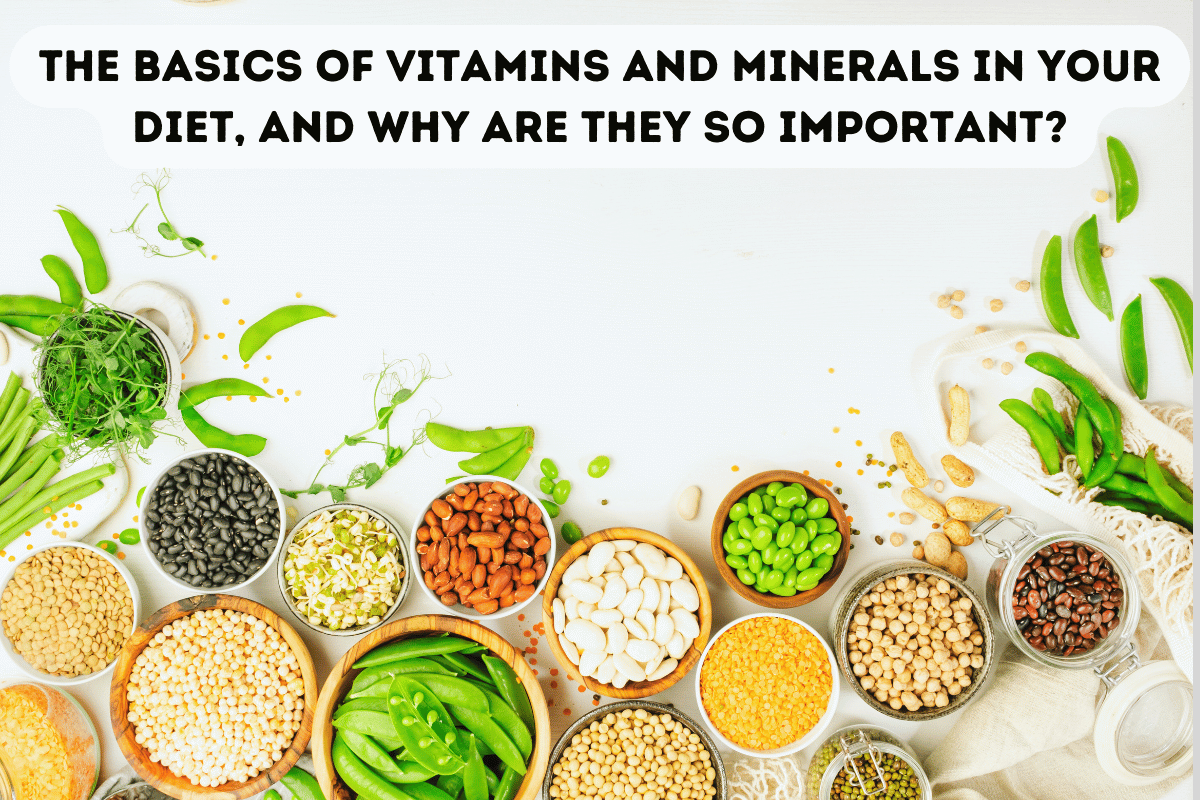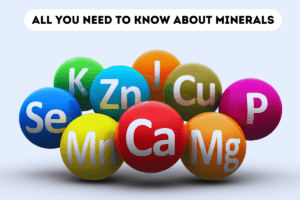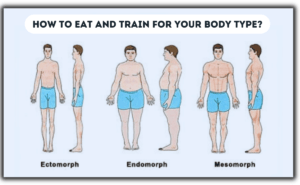In this article, I would like to discuss the importance of vitamins and minerals in our diet. Vitamins and minerals are micronutrients required in small quantities in the body compared to macronutrients and are essential for several different functions. Many metabolic pathways could fail to function correctly without sufficient vitamins, causing ill health and even death. Minerals form components of co-enzymes, hormones, and vitamins. They are involved in tissue-building, forming part of both the hard and soft structures of all the body’s tissues. Also, minerals are essential nutrients involved in many of the body’s regulatory functions, enabling energy production, growth, and healing. Now, let’s speak more in-depth about the main characteristics of vitamins and minerals.
All you need to know about vitamins is that:
- Vitamins are naturally occurring chemicals and are essential for normal growth and development, repairing and maintaining healthy tissue and cells. They do not provide energy (calories) themselves within the body. Still, they act as essential links and regulators in the systems that release energy from food for the body to use.
- Vitamins, unlike minerals, are organic and can be readily destroyed. Many processes can destroy certain types of vitamins (mostly water-soluble vitamins). Heat, light, physical handling, alkali, and exposure to air can all have a detrimental effect on the quality of the overall vitamin content. Also, some vitamins are good antioxidants and help protect the body’s cells and systems against damage and disease.
- There are water-soluble and fat-soluble vitamins. Water-soluble vitamins, including the C and B vitamins, cannot be stored by the body. Daily intakes are required, but any excess of these vitamins will be lost in the urine. Fat-soluble vitamins such as A, D, E, and K are not destroyed by heat and can be stored within the body’s fat stores. My article “All you need to know about vitamins“ provides a more detailed overview of vitamins.
- Excessive amounts of vitamins can be harmful in some cases. Consuming food-based sources is less likely to cause this, which is why extra care should be taken when considering supplements.
- Some vitamins work cooperatively with each other, and some may have similar effects and can thus replace one another. However, a lack of one vitamin may prevent the others from being used if they work at different stages in the same chemical pathway. Also, vitamins are therefore measured in milligrams (mg) and micrograms (mcg or μg) compared to macronutrients, which are measured in grams (g).
As to minerals, they are inorganic substances which do not break down as they are elemental. They are found in the soil and absorbed into the plants that grow in the soil, which animals can eat. So, we can obtain minerals from foods of both plant and animal origin. Minerals are not destroyed or susceptible to heat, air, physical handling, processing, cooking and alkali. Also, you need to know that:
- Minerals can be grouped into macro-minerals, which are required in amounts >100 mg/day and micro-minerals, also known as trace minerals, which are required in amounts <100 mg/day (Table No1. Macro and micro-minerals).
- Bones are the most significant mineral storage sites in the body. They are involved in a continual cycle of absorbing and excreting minerals to the tissues that require them.
- Minerals play an essential role in the body’s immune defence. Selenium, copper, manganese, and zinc are all antioxidants and intrinsic to the body’s antioxidant defences. Zinc plays a key role in the body’s immune system.
- Minerals are components of co-enzymes, hormones, and vitamins. They are also involved in tissue building, forming part of both the hard and soft structures of all the body’s tissues. My article “All you need to know about minerals” provides a more detailed overview of different minerals.
- Minerals are essential nutrients involved in many of the body’s regulatory functions, enabling energy production, growth, and healing. All mineral building and regulatory functions are shown below.
| Minerals building functions | Minerals regulatory functions |
| Red blood cells. Iron is utilised in haemoglobin and copper is used for red blood cells. | Nerve responses. Calcium and sodium along with all salts are balanced to control nerve responses. |
| Intestines. Many glandular secretions include minerals, such as sodium in intestinal juices, manganese in endocrine secretions, zinc in enzymes and chlorine in gastric juices. | Fluid pressure. Fluid pressure is controlled by using a balance of sodium and potassium. |
| Nails. Sulphur can be found in skin, nails and hair. | Muscle contraction and relaxation. Muscle contraction and relaxation requires potassium, phosphorus, chlorine, sodium, and calcium. |
| Soft tissue. All salts, especially potassium, sulphur, phosphorus and chloride salts, are the major constituents of the body’s soft tissue, such as nerves, glands and muscles. | Blood clotting. Calcium is intrinsic in blood clotting. |
| Teeth. Calcium and phosphorus are a major component of teeth and bones as the salt calcium phosphate. Fluoride is also important for teeth. | Antioxidant and immune defences. Selenium, copper, manganese and zinc are all antioxidants, and an intrinsic part of the body’s antioxidant defences. Zinc plays a key role in the body’s immune system. |
Antioxidants.
Also, it is important to talk separately about antioxidants. As their name suggests, antioxidants can help to prevent the harmful effects of oxidation and protect the body cells and tissues against damage from free radicals. A free radical is an atom or molecule with a ‘free’ or unpaired electron. Free radicals can react with other atoms and cause ‘oxidative damage’ to tissues and cells. This is why antioxidants are essential to our diet, as they help prevent diseases such as cancer and cardiovascular disease.
The main sources of antioxidants are vitamin A, vitamin C, and vitamin E (known as ‘ACE’ vitamins) and minerals like Copper, Zinc, Selenium, and Manganese. All these vitamins and minerals can be found in plenty of fruits and vegetables, whole grains, and nuts. For example, broccoli, carrots, peppers, vegetable oil, apricots, nuts/seeds, and whole grains.
Achieving your daily intake.
Unfortunately, nowadays, our food isn’t as rich in vitamins and minerals as it used to be. After years of abusing the soil with various chemical fertilisers, mineral levels may be less than optimal. Food processing can also significantly reduce its micronutrient content. This is why people can start thinking that buying supplements is the only way to get all the necessary vitamins and minerals. There can be situations where you may need additional supplementation, but before doing so, you need to consult with a doctor first, who will be able to analyse your diet and give appropriate advice about whether supplements are necessary. A simple blood test is a good option. And even when you are lacking in some micronutrients, you should try to get all the nutrients from your diet first. When getting all the nutrients from a well-balanced diet is impossible, supplements can be taken. Also, don’t forget that vitamins and minerals taken in high doses from supplements can be harmful (especially fat-soluble vitamins). As to real food, it’s almost impossible to overdose on vitamins and minerals from real food. Special groups to consider supplementation would be:
- The elderly. Those over 50 should ensure they get enough B6, B12, folate, vitamin D and calcium in their diet. Of course, before taking supplementation, these people should consult with their doctor.
- Vegetarians/vegans. Some vegetarians or vegans may not be achieving optimal intakes of vitamins and minerals found in the meat and dairy food groups (for example, vitamin B12). The article “All you need to know about vegetarians and vegans” provides more information on this subject.
- Athletes. Many athletes with increased activity are getting more pressure on their bodies, so they may need additional supplements to help optimise exercise performance and recovery. However, they should consult with a doctor first.
- Pregnant women. For the first 12 weeks of pregnancy, pregnant women are recommended to take a folic acid supplement. Some doctors may also recommend multivitamins or other calcium and vitamin D supplements.
- Post-menopausal women. A balanced diet providing all the essential nutrients should meet the body’s changing demands. Post-menopausal women should consume enough low-fat dairy products to ensure optimum calcium intake. This is especially important where osteoporosis has been diagnosed. However, some post-menopausal women still may need additional advice on supplementation from a medical/health professional.
Short overview of all macro and micronutrients.
| Macronutrients | ||
| Nutrient | Function | Sources |
| Carbohydrate | Carbohydrates provide energy for the body. | Can be found in all starchy foods, such as bread, rice, potatoes, pasta, and breakfast cereals; but also, in simpler forms as the sugars present in fruits, vegetables and milk. |
| Dietary fibre is a term that is used for non-digestible carbohydrates. Fibre is important for our health and for reducing the risk of some diseases (e.g., heart disease, type 2 diabetes, and colon cancer). It also helps our digestive health and reduces the risk of constipation. | High fibre breakfast cereals, wholegrain bread, whole wheat pasta, beans, pulses, fruit, and vegetables. | |
| Protein | Protein provides amino acids, some of which we can’t make ourselves and so need to get from our diet. Needed for normal growth and maintenance of health. Also provides energy. | Meat, fish, eggs, dairy foods, cereal products (such as bread), soya products, nuts and pulses. |
| Fat | Fat provides essential fatty acids (that we can’t make ourselves but need in small amounts) as well as energy. Required for a range of bodily processes and to maintain the normal structure of cells in the body. It also carries essential fat-soluble vitamins and is important for their absorption. | Fats and oils, meat and meat products, dairy foods, oily fish, nuts, seeds and avocados. |
| Micronutrients | ||
| (Water-soluble vitamins) | ||
| Vitamin B1 (Thiamin) | Helps to release energy from food. It also helps our nervous system and heart function normally. | Bread, fortified breakfast cereals, nuts and seeds, meat (especially pork), beans and peas. |
| Vitamin B2 (Riboflavin) | Helps to release energy from food and helps maintain normal skin. It helps to maintain a normal nervous system and helps to reduce tiredness. | Milk and milk products, eggs, fortified breakfast cereals, offal, some oily fish (e.g. mackerel and sardines), mushrooms and almonds. |
| Vitamin B3 (Niacin) | Helps to release energy from food and helps to maintain normal skin. It also helps the nervous system function normally and helps reduce tiredness. | Meat, poultry, fish and shellfish, wholegrains (e.g. brown rice, whole wheat pasta and quinoa), bread and some nuts and seeds (e.g. peanuts and sesame seeds). |
| Vitamin B6 | Helps to make red blood cells, which carry oxygen around the body. It helps our immune system work as it should, regulates hormones and helps to reduce tiredness. | Meat, poultry, fish, fortified breakfast cereals, egg yolk, yeast extract, soya beans, sesame seeds, some fruit and vegetables (e.g. banana, avocado and green pepper). |
| Vitamin B12 | Helps to make red blood cells, which carry oxygen around the body, and helps the nervous system function normally. Helps keep our immune system working as it should and helps to reduce tiredness. | Meat, fish, shellfish, milk, cheese, fromage frais, eggs, fortified yeast extract and fortified breakfast cereals. |
| Folate/ Folic acid | Helps to make red blood cells, which carry oxygen around the body. Helps the immune system work as it should and helps to reduce tiredness. It is also needed for the normal development of the nervous system in unborn babies. | Green leafy vegetables, some breads (e.g. malted wheat and brown bread), offal, peas and beans, oranges, berries and fortified breakfast cereals. |
| Vitamin C | Helps to protect cells from damage. Helps with the formation of collagen, which is important for normal bones, gums, teeth and skin. It also helps the immune system work as it should and the nervous system to function normally. | Fruit (especially citrus fruits, blackcurrants, strawberries, papaya and kiwi), green vegetables, peppers and tomatoes. |
| Fat-soluble vitamins | ||
| Vitamin A | Helps the immune system to work as it should. It also helps with vision and helps keep skin and the linings of some parts of the body, such as the nose, function normally. | Liver, cheese, eggs, dark green leafy vegetables and orange-coloured fruits and vegetables (e.g. carrot, sweet potato, butternut squash, cantaloupe melon and papaya). |
| Vitamin D | Helps the body to absorb calcium and helps to keep bones strong. It also helps muscles to function normally and the immune system to work as it should. | Oily fish, eggs, fortified breakfast cereals and fat spreads. In summer, the majority of people will get most of their vitamin D through the action of sunlight on the skin |
| Vitamin E | Helps to protect the cells in our bodies against damage. | Vegetable and seed oils (e.g. olive, rapeseed, sunflower, peanut oils) nuts and seeds (e.g. sunflower seeds and almonds), avocados and olives. |
| Vitamin K | Needed for the normal clotting of blood and is required for normal bone structure. | Green vegetables (including leafy greens, broccoli, green beans and peas) and some oils (e.g. rapeseed, olive and soya oil). |
| Minerals | ||
| Calcium | Helps to build and maintain strong bones and teeth, as well as the normal functioning of nerves and muscles. It also helps blood clot normally. | Milk, cheese, yogurt, fromage frais, some green leafy vegetables (such as kale), calcium-fortified dairy-alternatives, canned fish (where soft bones are eaten) and breads (white, brown and wholegrain). |
| Fluoride | Helps with the formation of strong teeth and helps to reduce the risk of tooth decay. | Tap water, tea (and toothpaste). |
| Iodine | Helps to make thyroid hormones. It also helps the brain to function normally. | Milk, yogurt, cheese, fish, shellfish and eggs. |
| Iron | Helps to make red blood cells, which carry oxygen around the body. It also helps the immune system to work as it should and helps the brain to function normally. | Offal, red meat, beans, pulses, nuts and seeds, fish (e.g. canned sardines, cockles and mussels), quinoa, wholemeal bread and dried fruit. |
| Magnesium | Helps to release energy from food. It also helps to maintain strong bones and helps muscles and nerves to function normally. | Nuts and seeds (e.g. Brazil nuts and sunflower seeds), wholegrain breakfast cereals, wholegrain and seeded breads, brown rice and quinoa. |
| Phosphorous | Helps to build strong bones and teeth and helps to release energy from food. | Red meat, poultry, fish, milk, cheese, yogurt, eggs, bread and wholegrains (such as brown rice and whole wheat pasta). |
| Potassium | Helps regulate the water content in the body and maintain a normal blood pressure. It also helps the nerves and muscles function normally. | Some fruit and vegetables (e.g. banana, blackcurrants, avocado, spinach, parsnip and beetroot), dried fruit (e.g. apricots, sultanas and figs), poultry, red meat, fish, milk and wholegrain breakfast cereals. |
| Sodium | Helps regulate the water content in the body. | Very small amounts found naturally in foods. Often added as salt (sodium chloride) during processing, preparation, preservation and serving. Currently intakes of sodium are too high and most people need to reduce their intake substantially. |
| Selenium | Helps to protect the cells in our bodies against damage. It also helps the immune system to work as it should, helps maintain normal skin and nails and normal fertility in males. | Some nuts and seeds (e.g. Brazil nuts, cashews and sunflower seeds), eggs, offal poultry, fish and shellfish. |
| Zinc | Contributes to normal mental skills and abilities and helps to maintain normal hair, skin, and nails. It also helps with the normal healing of wounds and contributes to normal fertility and reproduction. | Meat, poultry, cheese, some shellfish (e.g. crab, cockles and mussels), nuts and seeds (e.g. pumpkin seeds and pine nuts), wholegrain breakfast cereals and wholegrain and seeded breads. |
| Water | Not defined as a nutrient in the classical sense, but is essential for our bodies to work properly, for example for regulating body temperature, transporting nutrients around the body and for normal brain function. | All drinks including water, milk, fruit juice, tea and coffee. We actually get roughly 20% of our water requirements from the food we eat. Water-rich foods include fruit and vegetables, soups, stews and sauces. |
Source: British Nutrition Foundation.




